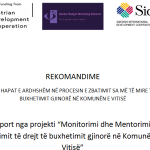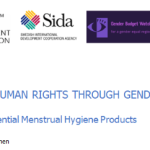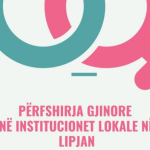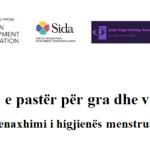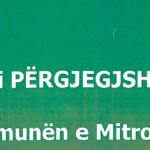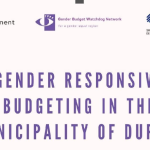
Despite the strategic documents Durres municipality is oriented from, there is still work to be done and space for improvement. The budget should: Reflect Gender Responsive Budget in more budget lines; Make data of fund allocation understandable and transparent. Provide funds for training in order to raise the capacities of the Gender Equality officers and gender-responsible staff in administrative units. Support CSOs that already implement or plan to implement GRB-related projects. Raise the fund for service provision in the Community center in Nishtulla (Roma community beneficiaries) and the Multifunctional center for support of Family and Children (recently opened). Support for programs that encourage women’s entrepreneurship.
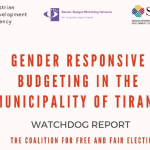
Citizens lack the knowledge of GRB meaning, the widespread opinion that it is addressed only to women and girls, and lack of training related to gender budgeting, especially in Baldushk and Farkë. Women in rural areas did not understand their role as advocates and beneficiaries of municipal services but only as beneficiaries of these services. Through the implementation of the project and focus groups, these wrong and misguided perceptions have now changed and this is positive not only for the citizens but also for the Municipality which will have a more accurate orientation regarding the needs of the community.
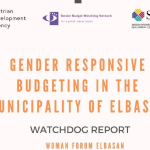
Elbasan municipality should: Increase the active role of the Gender Equality Officer as part of working groups in drafting strategies, and programs and when participatory budgeting meetings are organized and community needs are discussed. The establishment and operation of a rehabilitation center for victims of domestic violence with long-term residence are one of the priorities set by this municipality, for which it is recommended to continue working in order to budget this important service. Development of technical systems that enable the collection of an accurate database for local policy making. From a gender perspective, the most important systems to set up at the local government level are data systems that enable the collection, processing, and analysis of gender-disaggregated data. Gender-disaggregated data - collected to include both men and women, and analyzed by gender experts - are essential for the development of relevant public policies and services that respond to women's needs and priorities. and men, girls, and boys.
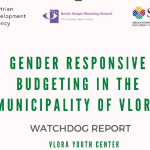
Through the implementation of the project are used the following GRB tools used are: Gender-based policy analysis; Gender budget beneficiary assessment; Gender budget effectiveness analysis. Some of the challenges that need to be addressed in the future: Lack of funds that can be used to identify problems of gender-based violence in villages or suburbs where the Roma and Egyptian community is focused; Lack of infrastructure for PwD, both on the streets and in institutions, which complicates their daily life and the chance to receive services; Housing problems for individuals and members who have applied for social housing but have not yet benefited; The need for budgeting for social services for young people; Need to open a day care center for people with disabilities
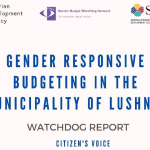
The participation of women in public hearings in urban areas is low, while in rural areas it is almost non-existent. Women living in these areas did not know what GRB was, how they should be involved in the process, their role in the process, the benefits they should have from the local budget, etc. In these circumstances, their voice has never been heard and they have never exercised the right given by the law related to GRB. After the training and activities carried out within the project implementation, they became more aware and understood their role and importance in being included in the public budget hearings organized each year by the municipality, and also how to present their proposals to the Municipality.
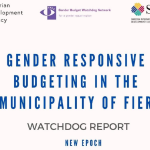
There are several problems that need to be addressed: Social service information campaign for women and girls that reduces poverty and provides better access to social services; Information campaign, near rural areas, regarding the functioning of the local and central government, services, various opportunities related to their quality of life and any other information relevant to the well-being of life and activity of residents; Gender data should be prepared for the provision of social services, in order to monitor equal access to services, with the specific aim of responding to the needs of excluded, marginalized and vulnerable groups and in particular, women and girls; Providing quality and well-targeted health services requires a good knowledge of the situation and specific gender needs.
